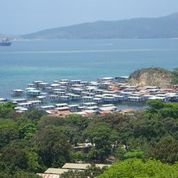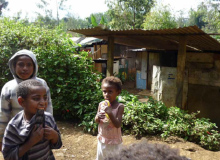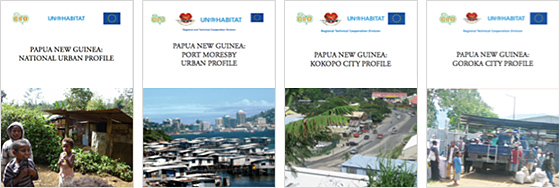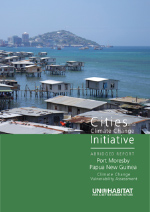Background and Objectives
Background

Papua New Guinea has an annual national population growth rate of 2.7 percent and increased rates of rural to urban migration and urban poverty, characterized by poor living conditions and deficits in the housing stock. Key urban infrastructure and services such as roads, drainage systems, as well as water and sanitation systems have deteriorated over the years due to poor maintenance and increased demand of a rising population.
Papua New Guinea is one of the leading Pacific Island Countries fulfilling its Pacific Urban Agenda (PUA) obligations of the Pacific Plan. It established an Office of Urbanization that developed the National Urbanization Policy 2010 - 2030 which was endorsed by the National Executive Council. UN-Habitat and the Office collaborate under a Cities Alliance funded project “Papua New Guinea Settlement Upgrading Programme”.
Objectives
The overall objective of the Programme is to formulate Settlement Upgrading Strategies at different tiers of government, identify primary and secondary infrastructure for possible funding in Port Moresby, identify potential impacts of climate change through vulnerability assessment, build capacity and strengthen relevant institutions by organizing tailor-made courses and share urban knowledge in the form of urban charters, pamphlets, brochures, public awareness. Initiate and develop policies, legislations and tool kits to help promote sustainable urban development approaches.
The project is being implemented through the following components
- a)Community-based Settlement Upgrading Action Plans (CSUAP)
- b)Adapt the NCDC City Profiling methodology to support Port Moresby to better address Climate Change Impacts
- c)City Infrastructure Investment Programme
- d)Capacity building and institutional strengthening
- e)Knowledge sharing, policy learning and tool kit development
- f)Monitoring and Evaluation.
Activities
Working on City Development Strategy, and Settlement Upgrading Programme so to prioritize infrastructure investments for Alotau, Buka, Kundiawa, and Vanimo cities, including a pre-feasibility studies for a prioritized investment project and the Taurama Valley, and Faniufa settlement upgrading proposal, to improve the living conditions of the urban poor facing hardship.
Results

Papua New Guinea is among 3 Pacific countries taking part in the Pacific component of EU funded global UN-Habitat Programme: “Participatory Slum Upgrading Programme” (PSUP). For more information:
http://unhabitat.org/initiatives-programmes/participatory-slum-upgrading/
UN-Habitat is committed to provide technical support to help implement the National Urban Plan through City Profiling and Settlements Upgrading. UN-Habitat in collaboration with Office of Urbanization, NCDC, Goroka and Kokopo Town Councils prepared Papua New Guinea National Urban Profile, Port Moresby Urban Profile, and Kokopo and Goroka Cities Profile.
In partnership with the National Capital District Commission, the Office of Climate Change, the Office of Urbanization, and the University of Papua New Guinea, UN-Habitat published Climate Change Vulnerability Assessment of Port Moresby, under the Cities and Climate Change Initiative.








































